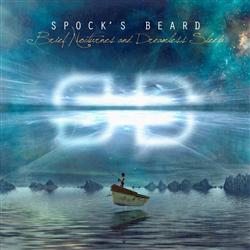
Album Review: Spock's Beard - Brief Nocturnes And Dreamless Sleep
Spock's Beard is known for three things; 1) having a silly name, 2) once having Neal Morse in the band, and 3) no longer having Neal Morse in the band. Simply put, their early run of albums helped to create the modern prog scene as it currently exists. What gets lost is that the band never stopped moving forward after Neal moved on to his solo career. Taking the Genesis route, Spock's Beard kept on going, even if they weren't receiving the same amount of attention they once did. It took time to find their bearings, but by the time of their last album, “X”, the band was back to making the kind of amazing prog records that their legacy demands.
Now we enter the third phase of the Spock's story, as frontman and drummer Nick D'Virgilio has moved on, replaced by Enchant singer Ted Leonard, who we heard on last year's very good debut from Affector. Breaking in a new voice is always a tricky proposition for a band, especially when one is a legendary figure in the genre, and the other had been with the band since the beginning. Injecting new blood at this stage of the game is a risk that doesn't always pay off.
What Spock's Beard is able to do masterfully on “Brief Nocturnes And Dreamless Sleep” is bridge the gap between the two eras of their history, while paving the way for a new path forward. Neal Morse resurrects the past, co-writing two songs on the album, while longtime collaborator John Boegehold continues the band's second era with his contributions, with Ted Leonard adding bits of himself into the mix.
The album wastes no time with indulging the past, opening with the Leonard penned “Hiding Out”, which is able to graft the Spock's aesthetic onto a slickly melodic framework. All the requisite playing is in place, but Leonard anchors the song with a tender vocal that neither former singer could match. It's a new tone, one that signals the greatness to come. “I Know Your Secret” is filled to the brim with spacy keyboards and a snaking guitar riff in the chorus that absolutely slays. The one-two punch is high quality Spock's prog, but is merely a precursor to the remainder of the album.
“A Treasure Abandoned” is where the album grows from being a solid bit of prog into a monster. From the emotional guitar work, to the keyboards that are essential to the atmosphere, to the bouncing bass-line through the verses, and the stunning chorus, it's an amalgam of everything good prog can and should be. The playing is deft yet restrained, and Leonard's delivery lifts the melodies to the stratosphere. It's a magical moment to hear.
Just when you think there aren't any more twists to be taken, Spock's Beard throws another one at you, refurbishing “Submerged”, a song off Leonard's solo album. They throw their flourishes onto the canvas, but don't change the fact that at heart it's a fantastic arena rock song, and the kind of thing someone should be directing at a throng of thousands. It's not what you would expect, but it's perfectly Spock's, and a bit of a mission statement for what this incarnation of the band hopes to achieve.
If the first half of the album is an exploration of the future, the second half looks back to the past. Neal Morse returns to co-write “Afterthoughts”, following in the tradition of the previous “Thoughts” classics. It harkens back to those songs, with its heavy riffing and four part counterpoint melodies, but does so with an entirely different feel than either of those songs. The opening riff in particular is disturbing the first time you hear it, a seemingly off-kilter circus rhythm that only makes sense, and becomes as addictive as musical heroin, after repeated listens. Morse packs the song with his trademark melodies, which are unmistakable, yet sound original when delivered by Leonard. The song is deceptive; underwhelming at first blush, then becoming an unforgettable ride that makes you question your sanity when you remember doubting its worth that first time through.
After that, “Something Very Strange” is the prog lover's delight of the album, eight minutes of virtuoso playing, twists and turns that make lay-people like myself wonder why I bother picking up an instrument. When capped off with Leonard's massive bellow of the simple chorus, it's another one of those moments that couldn't have occurred on a Spock's record until now, whereas “Waiting For Me” is the quintessential throwback. The second song co-written by Neal Morse, “Waiting For Me” is an epic pop song, if that makes sense. Over the course of the twelve minutes, there's plenty of emotional guitar playing and intricate keyboard work, but all of that surrounds a basic pop song. A damn good one, at that. Prog often gets a reputation for making the complex look simple, but it's at its best when it can make the simple look complex. Counter-intuitive though that may sound, what I mean is rather than relying on sheer instrumental prowess to wow the listener, the best prog bands can do all of that while still playing great songs, which is what Spock's Beard is able to do throughout this album.
“Brief Nocturnes And Dreamless Sleep” isn't as massive in scope as most prog releases, but it's focus means the impact when it hits is far deeper. Spock's Beard has managed to to tie the threads of their past, present, and future together in a package of songs that are progressive, filled with massive amounts of talent, and yet still can reach listeners of all stripes. Strip away the flashy bits, and you've still got an amazing collection of songs. Take it all together, and you not only have the early frontrunner for album of the year, you have a potential instant classic, and the best album of Spock's Beard's legendary career. Yes, it's that damn good.
[The special edition of the album comes includes a remix of “Something Very Strange”, and four bonus tracks. Three of them are enjoyable, but not up to the level of the proper album. “Down A Burning Road”, however, is a gorgeous song with some of Alan Morse's most expressive guitar playing. How this song didn't end up on the album is a mystery. It deserves to be heard.]

